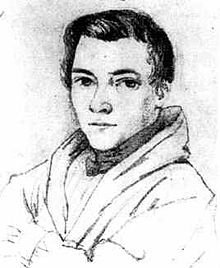Karl Wilhelm Feuerbach
German mathematician (1800–1834)
Karl Wilhelm Feuerbach | |
|---|---|
 | |
| Born | 30 May 1800 (1800-05-30) Jena, Saxe-Weimar, Holy Roman Empire |
| Died | 12 March 1834 (1834-03-13) (aged 33) Erlangen, Germany |
| Nationality | German |
| Alma mater | Albert Ludwigs University of Freiburg |
| Known for | Feuerbach's theorem |
| Scientific career | |
| Fields | Mathematician |
| Institutions | University of Basel |
| Notes | |
Brother of Ludwig Andreas Feuerbach | |
Karl Wilhelm Feuerbach (30 May 1800 – 12 March 1834) was a German geometer and the son of legal scholar Paul Johann Anselm Ritter von Feuerbach, and the brother of philosopher Ludwig Feuerbach. After receiving his doctorate at age 22, he became a professor of mathematics at the Gymnasium at Erlangen. In 1822 he wrote a small book on mathematics noted mainly for a theorem on the nine-point circle, which is now known as Feuerbach's theorem. In 1827 he introduced homogeneous coordinates, independently of Möbius.[1]
Works
- Eigenschaften einiger merkwürdigen Punkte des geradlinigen Dreiecks und mehrerer durch sie bestimmten Linien und Figuren. Eine analytisch-trigonometrische Abhandlung (Monograph ed.), Nürnberg: Wiessner, 1822. online book at Google Books ("Properties of some special points in the plane of a triangle, and various lines and figures determined by these points: an analytic-trigonometric treatment")
- Grundriss zu analytischen Untersuchungen der dreyeckigen Pyramide ("Foundations of the analytic theory of the triangular pyramid")
References
- ^ "Feuerbach". sfabel.tripod.com. Retrieved 2020-07-21.
External links
- Works by or about Karl Wilhelm Feuerbach at Internet Archive
- O'Connor, John J.; Robertson, Edmund F., "Karl Wilhelm Feuerbach", MacTutor History of Mathematics Archive, University of St Andrews
- Feuerbach's Theorem: a Proof
- Karl Wilhelm Feuerbach: Geometer
 Media related to Karl Wilhelm Feuerbach (geometer) at Wikimedia Commons
Media related to Karl Wilhelm Feuerbach (geometer) at Wikimedia Commons













